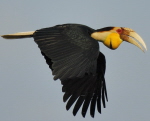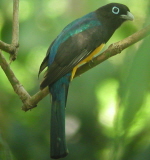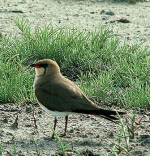|
BIRDINGPAL TOURS |

Birdwatching tours around the world |

Fixed date birdwatching tours around the world |

Field guides for Syria |
Birdwatching in Syria
Birding contacts and birdwatching information

Local Birdingpal Contacts
|
Local Birdwatchers
Using the Birdingpal resources you must agree to the following: If you contact a local Birdingpal and make arrangement to go birding, you should note it is common courtesy to make sure you show up for the appointment. If for any reason you are unable to do this, the least you must do is contacting the local Pal right away. Please note that most Birdingpals are serious birdwatchers. It is a privilege to contact them, and your message should reflect it. A local Pal does not get paid, but should he/she offer to take you out birding, using their own vehicle, it would be courteous to pay for the fuel. A lunch and/or a small gift would also be appropriate, something as simple as a souvenir of your country, or a pin from your local birding club. _____________________________________________________________ We want to hear about your experiences with Birdingpals. Please contact us with any comments or suggestions you have. CONTACT US _____________________________________________________________ | ||||||
| Initial | Last Name | Area | Available | Language | ||
|
Professional Guides If you contact a professional Birdingpal guide you must be prepared to pay a fee for guiding services. | ||||||
| Initial | Last Name | Area | Available | Language | ||
| A | Abdulla | Palmyra, Al Badia desert | Anytime | Arabic, English | ||
| Palmyra Eco-Guiding (PEG) Cooperative The Palmyra Eco-Guiding Cooperative (PEG) is a small locally-based cooperative of four motivated and well-trained Palmyreans (Ahmed Khaled Abdullah, Mahmud Abdullah, Adeeb Al Assaed, Ghazy Al Qaim), recently established with the aim of ensuring an income to locals from biodiversity conservation. They have been trained in fauna field identification and eco-guiding by an international conservation biologist (Gianluca Serra) for about 4 years in the framework of a UN-FAO / Italian Cooperation project GCP/SYR/009/ITA). During this project the team participated in a major fauna surveying programme aimed at preparing a comprehensive database and high-quality photographic archive of the Palmyrean desert. The survey culminated in the discovery in April 2002 that at least one colony of Northern Bald Ibis Geronticus eremita persists in the Middle East(Serra 2003, Serra et al. 2003a). The team of eco-guides then became heavily involved in the successful protection program of the ibis colony during three subsequent breeding seasons (2002-2004) - the program focused on halting foreign poachers, raising the awareness of the nomad Bedouins, and collecting basic ecological data on the birds. The team has become highly self-motivated, ecologically committed, skilled in bird field identification and fluent in English. During the past 3 years they have experienced in the field what guiding foreign visitors means, as they were put in contact with several European birdwatchers and eco-tourists - whose comments about the guides were positive and enthusiastic. In January-February 2004, the 4 members of the team participated in a major ornithological expedition in Syria promoted and supported by the Ornithological Society for the Middle East (OSME), Wetlands International and BirdLife International (birdwatchers of 6 different nationalities were involved) (Murdoch et al. 2004) - they will soon receive certificates from OSME acknowledging their participation in the expedition and their successful learning. During this expedition they got to know the most faunally interesting areas in Syria - so their wildlife knowledge and experience now extends throughout Syria. The most tangible and outstanding result of the involvement of these locals in the project’s conservation activities is the raising of ecological awareness amongst the local population(Serra et al. 2003b). One of them, only three years ago well renowned in the village for his hunting skills and passion, is now wholeheartedly engaged in halting hunting not only locally but also nationally. Their awareness has also grown in a broader sense: they are presently aware that they are kind of ‘conservation pioneers’ and key human resources nationally. More importantly, a sense of a mission finally dawned inside them: they seem perfectly aware that the country’s natural heritage needs their engagement and commitment to survive. The guides of operate 4x4 vehicles and have full driving licences, they know very well how to navigate and drive in the desert, have many contacts and friends among Bedouin nomads of the Palmyrean desert and all around Syria, know the common English names of birds, and know the major star constellations. By choosing this small-scale cooperative to better enjoy Syrian nature and desert culture, you will not only be rewarded in terms of wholly fulfilling your visit expectations, but you will also significantly contribute to the conservation of the nature and birds of this magnificent country. Gianluca Serra, November 2004 Contacts: The four Palmyrean guides are: Ahmed Khaled Abdulla(32 years old, ex-shepherd from Beni Khaled Bedouin tribe), Mahmud Abdullah(44 years old, ex-driver of the project), Adeeb Assaed(47 years old, ex-hunter from Palmyra), Ghazy Al Qaim(49 years old, technician and head ranger at the Al Talilareserve). To get in contact with the guides (preferably in advance!): Ahmed Khaled Abdulla, Ph: 00963 94 876 119 / 31 915 117 or 00963 31 914 356 | ||||||
|
Local Information | ||||||
| Service | Information | |||||
| Wikipedia, the free encyclopedia | Syria | |||||
| Local weather | Yahoo | |||||
| Birding Hotspots around the world | Sites | |||||
Last update 17/02/2014